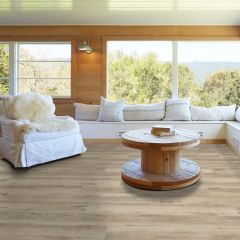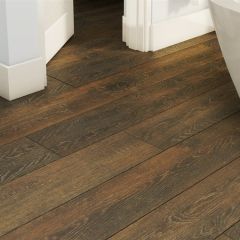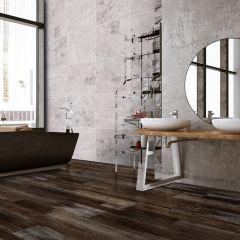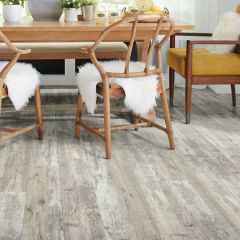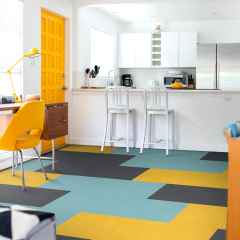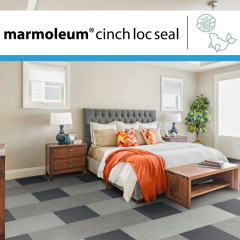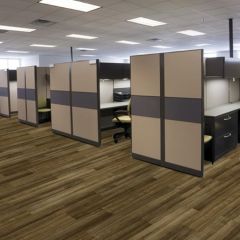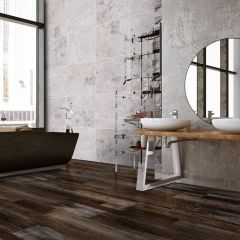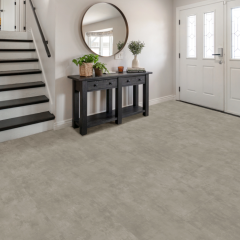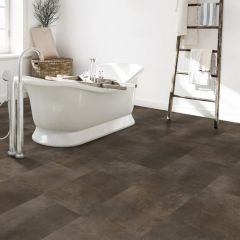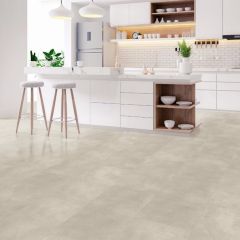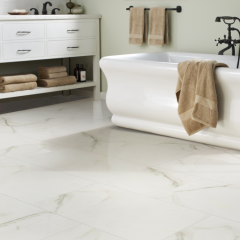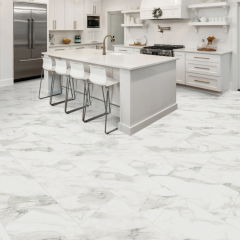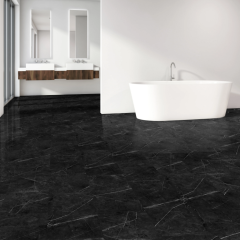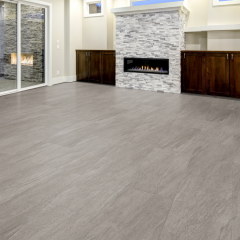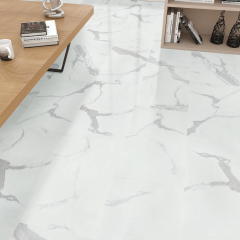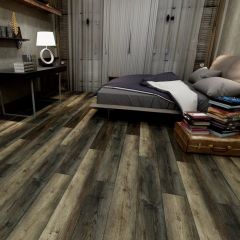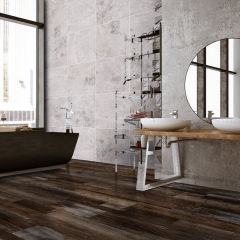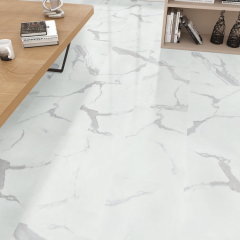Linoleum, Vinyl & VCT
Resilient Flooring
Resilient flooring products are all about versatility. Whether you’re looking for something beautiful to compliment a stunning banquet room or something durable and cost-effective to cover a school lunchroom, there’s a resilient solution that can meet your specific needs. Just to clear it up, resilient flooring is defined as a non-textile floor that provides underfoot comfort and characteristically bounces back from repeated traffic or compression. The Resilient flooring category includes vinyl sheet flooring, vinyl composition tile (VCT), luxury vinyl tiles and planks, linoleum, rubber, cork and other types of synthetic flooring. Resilient flooring comes in both roll and tile form. And it comes in various color, shape, and size for any project.
Resilient flooring means durability, It’s got all the advantages of relatively firm flooring plus the benefits of a bounce-back surface which means no permanent indentions from heavy furniture or appliances. It is great floor for the environment and The long lasting strength of resilient flooring helps keep it out of landfills because you won’t have to replace it as often. With resilient floor you get true design flexibility and it lets you keep up with the leading design trends. The large selection of colorful styles and patterns can meet the aesthetic needs of almost any project from traditional conservative to futuristic modern.
Cork Flooring
Similar to rubber and linoleum, cork is an old product with renewed interest since the product comes from a renewable resource, the bark of a tree commonly known as Cork Oak. Predominantly found in Spain and Portugal, Cork Oak is native to the Mediterranean region. Cork flooring is made by removing the bark of the Cork Oak (Quercus Suber). Cork flooring It is a natural product so it will show the natural variations that occur in the bark. Cork is installed much like hardwood and once installed, a urethane coating is applied although there are prefinished products on the market today. Cork absorbs moisture so it is not suitable for bathrooms or any area with high moisture content.
Linoleum
Invented in the 1860s – with a number of improvements since then – linoleum as a floor covering has been largely replaced with vinyl flooring which has similar properties of flexibility and durability, but which has greater brightness and translucency. Linoleum is experiencing a revival in popularity, due to its natural ingredients and environmental properties. Included in these natural ingredients are linseed oil, wood flour, limestone, cork, and tree resins. Linoleum requires much less wax and finish, and cleaning and stain removal are faster and easier. End-users reduce their use of water, detergent and energy. Because Harmonium linoleum is so much easier to maintain, it generates a quicker ROI.
Rubber Flooring
With waterproof and slip-resistant properties that make it ideal for harsh environments that require frequent or harsh cleaning, rubber flooring is commonly used in institutional and commercial facilities. The surface texture can vary from smooth marbleized or chip designs to many raised textures, including circular, square, flagstone, hammered or diamond-plate patterns and many others. Some rubber tiles are engineered to work most anywhere petroleum products, animal fats and vegetable oils are present providing a safe work environment. While most of today’s rubber flooring contains synthetic materials some natural rubber is still used by manufacturers to create their products. Rubber presents another excellent flooring choice, especially if you’re looking for something durable and quiet and warm to walk on. In the past rubber floors were definitely appreciated for function over beauty, but today’s rubber flooring can be as dazzling as any other type of resilient flooring choice. Rubber typically has a higher initial cost and requires very experienced, professional installation. Rubber flooring is perfect for Fitness centers, Health clubs, Gymnasiums, Dance floors and other high-impact spaces
VCT or Vinyl Composition Tile
The primary raw material in VCT is about 85% natural limestone, highly abundant ingredient. A readily available material and due to the recyclability of VCT, bringing used flooring back in to the production process. , highly abundant ingredient. Vinyl and color pigments are added to provide product flexibility and design. The tiles are typically manufactured in 12” x 12” squares and can be used in a wide range of color and design combinations to create unique, custom effects. VCT is a highly popular choice due to its low cost and aesthetic offering. In fact, vinyl composition tile accounts for more square footage than any other category of resilient flooring. Millions of square feet of this well-known product have been installed in retail stores supermarkets, hospitals, and schools. It is also a very popular do-it-yourself product since it is easy to handle and install. VCT contains both post-consumer and pre-consumer recycled content.
Vinyl Sheet Flooring
The vinyl sheet flooring offered today is the product of years of advancements in manufacturing technology and design capabilities. Sheet vinyl flooring is typically offered in 6’ and 12’ widths with products for both the professionally installed and do-it-yourself installations. A word of caution though - installing a vinyl sheet floor is a very exacting process that requires excellent skills for cutting and seaming, and knowledge about what the flooring is being installed over. Professional installation by a reputable flooring dealer is highly recommended and may save you money in the long run. If the area to be covered is wider than the flooring material, seaming will be necessary and it needs to be pointed out that certain patterns hide seams better. For example, seams will typically be less visible in tile patterns with grout lines. Vinyl sheet provides the perfect flooring solution for many areas because of its low cost, durability, and easy maintenance. Couple this with the beautiful array of available styles and colors and easy installation/removal and you’ve got a truly superior flooring option.
Vinyl Tiles & Vinyl Planks
Solid Vinyl Tile (SVT), Luxury Vinyl Tile (LVT), Luxury Vinyl Plank (LVP), Stone Plastic Composite (SPC), Wood Plastic Composite (WPC)
We are supplier of SVT, LVT, LVP, SPC & WPC in Los Angeles area & Southern California. These products are different from vinyl composition tile (VCT) in that they typically have a much higher vinyl content for superior embossed like surfaces and performance. The Luxury Vinyl Tile reference relates to the exceptional visuals that replicate natural stone, wood, concrete, metal, and other materials. Many of these products such as the wood designs are made in plank form to enhance the look of the finished installation.
SPC & WPC Difference
SPC or Stone Plastic Composite, also known as RVP (rigid vinyl plank), layers from top to bottom: Finish coat => Wear Layer => Design Layer => SPC Core
The nature of rigid core make SPC stand out from the rest due to following reasons:
A) Rigid core: SPC mainly consists of limestone allowing maximum durability and structure stability. That's why SPC is an ideal choice for both commercial and residential use.
B) Handle scratch/pressure with ease: Stone plastic rigid core has high density and allowing SPC products offer better resistance from scratches or dents from heavy items or furniture being placed on top of it.
C) Waterproof/damp proof: Prevents product from deforming and make SPC easy to take care of. Worry less and enjoy your life more.
D) Eco-friendly: Recyclable material which matches the "Sustainable Development Goals" set by United Nations.
E) Simple installation: An easy-to-install click system is used for SPC with no extensive subfloor prep prior to installation required. (faster installation, floating installation is easier than traditional glue down vinyl)
F) Limitless design: Featuring modern digital technology, SPC offer 'limitless' designs and colors. Whether it's wood-like or anything you can think of - the choice is in your hand.
WPC or Wood Plastic Composite, contains wood-like material or wood flour. Usually consists of five layers from top to bottom: Finish Coat => Wear Layer => Design Layer => Vinyl Layer => WPC Core
The nature of wpc core gives all WPC products advantages over laminate products for the following reasons:
A) Water/Heat resistant: When in contact with water and heat/fire, the structure within wpc would remain the same and making it unlikely to deform.
B) Quiet all around: With the presence of underlayment (attached padding), WPC products do a wonderful job absorbing impact sound which make them a quieter product.
C) Comfort you can feel: WPC is generally more comfortable underfoot. Thanks to the padding attached, more cushion is available and walking with barefoot become a simple joy of life.
D) You will find the design that matches your taste: WPC Brings out a stunning look by producing maximum floor texture since WPC has softer vinyl layer which could be embossed deeper.


